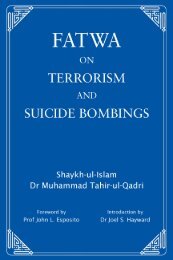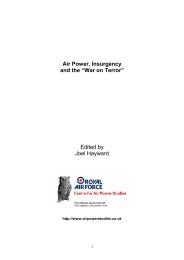Air Power, Insurgency and the âWar on Terrorâ - Prof. Joel Hayward's ...
Air Power, Insurgency and the âWar on Terrorâ - Prof. Joel Hayward's ...
Air Power, Insurgency and the âWar on Terrorâ - Prof. Joel Hayward's ...
You also want an ePaper? Increase the reach of your titles
YUMPU automatically turns print PDFs into web optimized ePapers that Google loves.
<str<strong>on</strong>g>Air</str<strong>on</strong>g> <str<strong>on</strong>g>Power</str<strong>on</strong>g> <str<strong>on</strong>g>and</str<strong>on</strong>g> Counter-insurgency: Back to <str<strong>on</strong>g>the</str<strong>on</strong>g> Basics<br />
For <str<strong>on</strong>g>the</str<strong>on</strong>g> last couple of years <str<strong>on</strong>g>the</str<strong>on</strong>g> US Army Comm<str<strong>on</strong>g>and</str<strong>on</strong>g> <str<strong>on</strong>g>and</str<strong>on</strong>g> General Staff College has been<br />
dealing with <str<strong>on</strong>g>the</str<strong>on</strong>g> issue of effective leadership in counter-insurgency <str<strong>on</strong>g>and</str<strong>on</strong>g> have decided<br />
that officers need cultural expertise. The model of leadership held up in <str<strong>on</strong>g>the</str<strong>on</strong>g> Staff college<br />
course instructi<strong>on</strong> is T E Lawrence, more popularly known as “Lawrence of Arabia.” Staff<br />
College students study how Lawrence used his deep knowledge of <str<strong>on</strong>g>the</str<strong>on</strong>g> Arab language<br />
<str<strong>on</strong>g>and</str<strong>on</strong>g> culture to move Arab leaders in <str<strong>on</strong>g>the</str<strong>on</strong>g> directi<strong>on</strong> that he, <str<strong>on</strong>g>and</str<strong>on</strong>g> sometimes <str<strong>on</strong>g>the</str<strong>on</strong>g> British<br />
government, wanted.<br />
This is a case in which I believe that <str<strong>on</strong>g>the</str<strong>on</strong>g> US Army, for all its enthusiasm <str<strong>on</strong>g>and</str<strong>on</strong>g> good intenti<strong>on</strong>s,<br />
has got it wr<strong>on</strong>g. First of all, <strong>on</strong>e should ask if <str<strong>on</strong>g>the</str<strong>on</strong>g> T E Lawrence model is appropriate for<br />
<str<strong>on</strong>g>the</str<strong>on</strong>g> average US Army officer. After all, Lawrence was a multi-lingual, psychopathic genius<br />
who pushed his own versi<strong>on</strong> of a gr<str<strong>on</strong>g>and</str<strong>on</strong>g> strategic agenda in a <str<strong>on</strong>g>the</str<strong>on</strong>g>atre of war. I suspect that<br />
<strong>on</strong>e Lawrence in a <str<strong>on</strong>g>the</str<strong>on</strong>g>atre of war was more than enough. In any case, Lawrence’s act is a<br />
hard <strong>on</strong>e to follow, <str<strong>on</strong>g>and</str<strong>on</strong>g> it might not be reas<strong>on</strong>able for <str<strong>on</strong>g>the</str<strong>on</strong>g> US Army to expect its field grade<br />
officers to be cultural experts <strong>on</strong> <str<strong>on</strong>g>the</str<strong>on</strong>g> level of Lawrence.<br />
To be successful in counter-insurgency, <str<strong>on</strong>g>the</str<strong>on</strong>g> senior military officer does not need to be<br />
a genius, or even a cultural expert. What <str<strong>on</strong>g>the</str<strong>on</strong>g> effective leader needs is what airmen call<br />
“situati<strong>on</strong>al awareness.” For a senior officer in counter-insurgency, <str<strong>on</strong>g>the</str<strong>on</strong>g> specific requirement<br />
is political situati<strong>on</strong>al awareness; a thorough underst<str<strong>on</strong>g>and</str<strong>on</strong>g>ing of <str<strong>on</strong>g>the</str<strong>on</strong>g> political c<strong>on</strong>text of <str<strong>on</strong>g>the</str<strong>on</strong>g><br />
insurgency. This requires an underst<str<strong>on</strong>g>and</str<strong>on</strong>g>ing of <str<strong>on</strong>g>the</str<strong>on</strong>g> different facti<strong>on</strong>s, <str<strong>on</strong>g>the</str<strong>on</strong>g>ir motivati<strong>on</strong>s,<br />
<str<strong>on</strong>g>and</str<strong>on</strong>g> <str<strong>on</strong>g>the</str<strong>on</strong>g>ir goals. It requires an underst<str<strong>on</strong>g>and</str<strong>on</strong>g>ing of <str<strong>on</strong>g>the</str<strong>on</strong>g> fundamental issues of <str<strong>on</strong>g>the</str<strong>on</strong>g> insurgency,<br />
as well as being able to look for realistic political soluti<strong>on</strong>s. A senior leader in counterinsurgency<br />
needs to recognise <str<strong>on</strong>g>the</str<strong>on</strong>g> political dimensi<strong>on</strong> of his policies <str<strong>on</strong>g>and</str<strong>on</strong>g> carefully employ<br />
<str<strong>on</strong>g>the</str<strong>on</strong>g> resources available to fur<str<strong>on</strong>g>the</str<strong>on</strong>g>r <str<strong>on</strong>g>the</str<strong>on</strong>g> political objectives.<br />
A good example of effective senior leadership in counter-insurgency is General Gerald<br />
Templer, who served as military comm<str<strong>on</strong>g>and</str<strong>on</strong>g>er <str<strong>on</strong>g>and</str<strong>on</strong>g> governor general of Malaya at <str<strong>on</strong>g>the</str<strong>on</strong>g> height<br />
of <str<strong>on</strong>g>the</str<strong>on</strong>g> insurgency, from early 1952 to 1955. Templer inherited a bad situati<strong>on</strong>. When he<br />
took comm<str<strong>on</strong>g>and</str<strong>on</strong>g> <str<strong>on</strong>g>the</str<strong>on</strong>g> insurgency had been going for four years <str<strong>on</strong>g>and</str<strong>on</strong>g> was steadily increasing<br />
in <str<strong>on</strong>g>the</str<strong>on</strong>g> level of violence. Although <str<strong>on</strong>g>the</str<strong>on</strong>g> British <str<strong>on</strong>g>and</str<strong>on</strong>g> Malay forces had killed many insurgents,<br />
<str<strong>on</strong>g>the</str<strong>on</strong>g> insurgent strength was steadily increasing. Templer’s leadership over three years was<br />
a key element in turning <str<strong>on</strong>g>the</str<strong>on</strong>g> situati<strong>on</strong> around, <str<strong>on</strong>g>and</str<strong>on</strong>g> his approach to counter-insurgency is<br />
worthy of study.<br />
Gerald Templer was a highly intelligent officer, but no genius. He had an outst<str<strong>on</strong>g>and</str<strong>on</strong>g>ing<br />
record as a c<strong>on</strong>venti<strong>on</strong>al soldier, having comm<str<strong>on</strong>g>and</str<strong>on</strong>g>ed a divisi<strong>on</strong> <str<strong>on</strong>g>and</str<strong>on</strong>g> later a corps during<br />
World War II. Yet his success as leader in Malaya was lees a functi<strong>on</strong> of his c<strong>on</strong>venti<strong>on</strong>al<br />
war skills than an intrinsic talent to study a situati<strong>on</strong> <str<strong>on</strong>g>and</str<strong>on</strong>g> grasp its essentials. Templer<br />
212<br />
<str<strong>on</strong>g>Air</str<strong>on</strong>g> <str<strong>on</strong>g>Power</str<strong>on</strong>g>, <str<strong>on</strong>g>Insurgency</str<strong>on</strong>g> <str<strong>on</strong>g>and</str<strong>on</strong>g> <str<strong>on</strong>g>the</str<strong>on</strong>g> “War <strong>on</strong> Terror”





